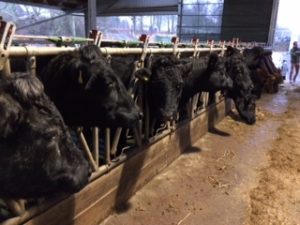Effect Of Time Of Feeding On Calving
16 March 2017 Changing the time of feeding has been shown to have an effect on the time of day cows will calve. In a trial on four commercial spring calving farms:
Changing the time of feeding has been shown to have an effect on the time of day cows will calve. In a trial on four commercial spring calving farms:
- Feeding the daily roughage allowance as normal in the morning resulted in 43% of cows calving at night.
- Moving to late evening feeding, around 10 pm, reduced the number of cows calving at night to only 21% with the peak time of calving occurring between 6 and 8 am.
On a practical level, this may be achieved by laying out the feed during “normal” working hours, but keeping the cows away from the food with a gate. When the stocksperson goes out to check cows last thing in the evening the gate is opened and the cows allowed to feed.
After eating, cows will lie down to ruminate for several hours. This will delay calving and increase the likelihood of calving occurring during “normal” working hours. Less night calvings means a more rested stocksperson to attend calvings during the day. Extra staff to assist is generally available during the daytime.
Basil Lowman, basil.lowman@sac.co.uk
Sign up to the FAS newsletter
Receive updates on news, events and publications from Scotland’s Farm Advisory Service
